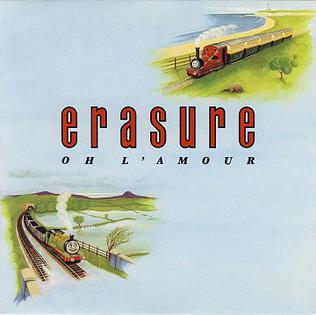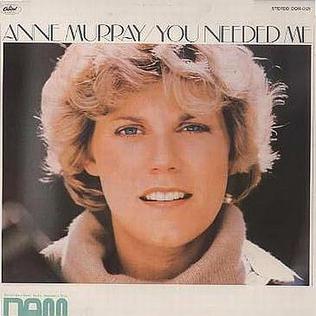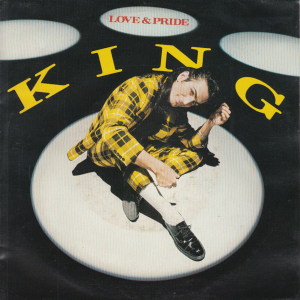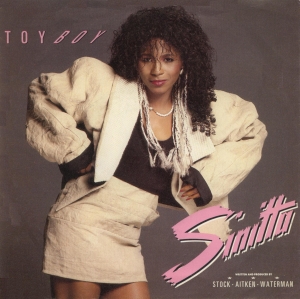
Sinitta Malone, known mononymously as Sinitta, is a British-American singer. She initially found commercial success in the mid-1980s with the single "So Macho" and had several other hits during the decade. In the 2000s, she became known for television appearances, including Loose Women, The Xtra Factor and This Morning. She took part in the ITV show I'm a Celebrity... Get Me Out of Here! in 2011.

"The Loco-Motion" is a 1962 pop song written by American songwriters Gerry Goffin and Carole King. "The Loco-Motion" was originally written for R&B singer Dee Dee Sharp, but Sharp turned the song down.

"Oh L'amour" is a song by English synth-pop duo Erasure, released in April 1986 as their third single. Written by Erasure members Vince Clarke and Andy Bell, it is a lament from someone experiencing unrequited love. The song is an uptempo, synth-pop dance track and its popularity was further fueled in dance clubs by the "Funky Sisters Remix", which appeared on the UK 12-inch single and as a bonus track on the US edition of Erasure's debut album, Wonderland (1986). A different mix of the song was submitted for the single release, adding new instrumentation and extra sounds. This version appears on all of the band's compilation albums. A version of the 12" single was included with early copies of the debut LP Wonderland. One of the B-sides is a cover version of "Gimme! Gimme! Gimme! ", the first time Erasure covered a song from the ABBA songbook. It was issued by Mute Records in the UK and Sire Records in the US to herald the June release of Wonderland, but became the third consecutive commercial failure for the band in both territories. Despite its low chart placement, "Oh L'amour" has proven to be one of Erasure's signature songs, due to its popularity in dance clubs. It remains a favourite among fans, particularly when performed live.

"No More Tears (Enough Is Enough)" is a 1979 song recorded by American singers Barbra Streisand and Donna Summer. It was written by Paul Jabara and Bruce Roberts, and produced by Giorgio Moroder and Gary Klein. The song was recorded for Streisand's Wet album and also as a new track for Summer's compilation double album On the Radio: Greatest Hits Volumes I & II. The full-length version was found on Streisand's album, while a longer 11-minute edit (the 12" version) was featured on Summer's album. The longer 12" version features additional production by frequent collaborator Harold Faltermeyer, and incorporates a harder rock edge.

"You Needed Me" is a song written by Randy Goodrum, who describes it as being about "unconditional undeserved love". It was a number-one single in the United States in 1978 for Canadian singer Anne Murray, for which she won a Grammy Award. In 1999, Irish pop band Boyzone recorded a hit cover of the song that reached number one on the UK Singles Chart.

"Love & Pride" is the debut single by Coventry band King, produced by Richard James Burgess and featured on the band's first studio album, Steps in Time.
Fanfare Records was a British record label that was founded by Iain Burton and Simon Cowell. Burton and Cowell worked together at Fanfare Records for eight years. The label was most successful during the 1980s. The label's biggest success came with Sinitta.

"Let's Go All the Way" is a song by American musical group Sly Fox. Released as a single in 1985 from their debut studio album of the same name, the record became a sleeper hit, entering the top 10 of the singles charts in both the US and the UK the following year. Despite receiving considerable commercial and critical success, the group failed to match expectations with their later singles, and are sometimes referred to as a one-hit wonder. Original MTV veejay Martha Quinn has described "Let's Go All the Way" as "one of the funkiest songs ever".

"Right Back Where We Started From" is a song written by Pierre Tubbs and J. Vincent Edwards, which was first recorded in the middle of 1975 by British singer Maxine Nightingale for whom it was an international hit. In 1989, a remake by British-American singer Sinitta reached No. 4 on the UK Singles Chart. The music features a significant repetitive sample from the song "Goodbye, Nothing to Say", written by Stephen Jameson and Marshall Doctores, which was recorded first by Jameson under the name of Nosmo King, and then by the Javells featuring Nosmo King, both in 1974.
James George Hargreaves, known as George Hargreaves or J. G. Hargreaves, is an English religious minister, community worker, political campaigner, former politician, former music producer, songwriter, TV producer and currently working as a Christian movie promoter, screenwriter and missionary. He was also leader of the Christian Party, having founded it in 2004.

"Loverboy" is Billy Ocean's second single from his 1984 album, Suddenly. It was produced by Keith Diamond and reached number 2 on the US Billboard Hot 100 as well as hitting number 20 on the soul chart, and number 15 on the UK Singles Chart in February 1985. It also reached the top spot of the Hot Dance Music/Club Play chart in the US, in an extended version. The track was released on the Jive label under the catalogue reference, JIVE 80. The song was played in the first episode of the long-running BBC One medical drama Casualty on 6 September 1986.

Sinitta! is the debut studio album by British singer Sinitta, released in 1987. It features her biggest and best-known international hit single "So Macho".

"Feels Like the First Time" is a song by American-British singer Sinitta. The song was released in 1986 as her self-titled debut album's third single. The song performed poorly, peaking at number 45 in the UK in August 1986. It spent 5 weeks on the chart, whereas, in contrast, "So Macho" the album's second single had been on the UK chart for 28 weeks in 1986, peaking at number 2.

"Toy Boy" is a song by American-British singer Sinitta. Written and produced by Stock Aitken Waterman, it was released on 25 July 1987 and became the fourth single in her self-titled debut album, which came out on 26 December of the same year. It became a hit in the UK and in other European countries where it reached the top ten.

"GTO" is a song by American-born singer Sinitta. Produced by Stock Aitken Waterman, it was released in 1987 as the fifth single from her self-titled debut album. The song is about a girl whose boyfriend cares more about his car, in the music video a Ferrari 250 GTO, than her. The song was a top-20 hit in the UK, peaking at number 15, and reached the top ten in several European countries.

"Cross My Broken Heart" is a song by American-born pop singer Sinitta. It was released in March 1988 by Fanfare Records as the sixth and final single from her self-titled debut album (1987). The song was written and produced by Stock Aitken Waterman, and was successful in the UK where it was a top 10 hit, peaking at number six. It was certified silver by the BPI. The B-side contains a remix of her 1987 hit, "Toy Boy".

"I Don't Believe In Miracles" is a song by American-British singer Sinitta, released in September 1988 by Fanfare Records as the first single from her second album, Wicked (1989). The song was written and produced by Stock Aitken Waterman, and was a top 30 hit in UK and Ireland. It was also her last single produced by Stock Aitken Waterman, as after this release, Sinitta moved away from working directly with them although she continued to record at PWL under the direction of mixmasters Pete Hammond, Phil Harding and Ian Curnow.
"Love on a Mountain Top" is a 1968 song by singer Robert Knight. The song was written by Buzz Cason and Mac Gayden, who also penned "Everlasting Love". However, it only charted regionally in the Philadelphia and Pittsburgh area. Re-discovered by the UK's Northern soul scene, it got airplay by DJs in late 1973, causing a UK re-release of the record, where the song eventually entered the UK Singles Chart and peaked at number 10 in January 1974.
The following is a discography of singles and albums released by the British-American singer Sinitta.
"To Be a Lover" is a song written by William Bell and Booker T. Jones originally as "I Forgot to Be Your Lover", but best known as a cover by Billy Idol on his third studio album Whiplash Smile (1986). As the album's lead single, it became Idol's second top ten hit in the US, peaking at No. 6 on the Billboard Hot 100 and No. 22 on the UK Singles Chart.














